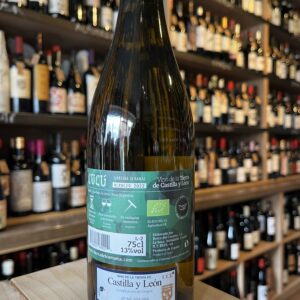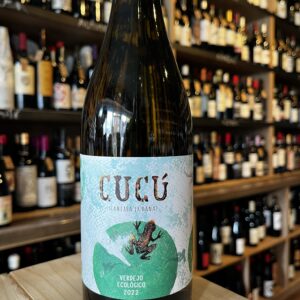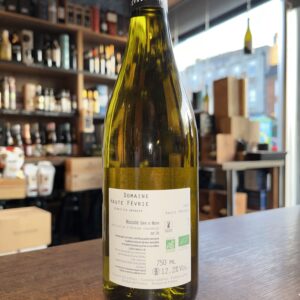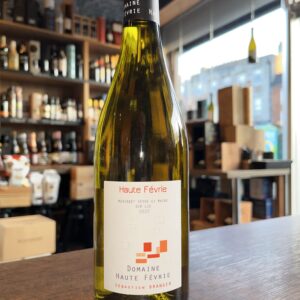-
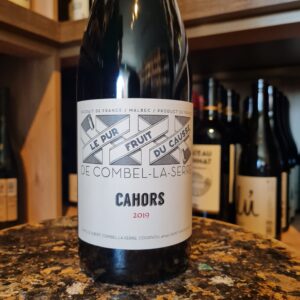 This lovely organic red is made from 100% Malbec (called Auxerrois in Cahors), ferments with indigenous yeasts, and ages in cement. This is a fruit-forward, easy-drinking style made for immediate consumption. And as soon as you pop a bottle, you'll see why "immediate" is the term they use. It's too tasty to wait, so enjoy it!
This lovely organic red is made from 100% Malbec (called Auxerrois in Cahors), ferments with indigenous yeasts, and ages in cement. This is a fruit-forward, easy-drinking style made for immediate consumption. And as soon as you pop a bottle, you'll see why "immediate" is the term they use. It's too tasty to wait, so enjoy it! -
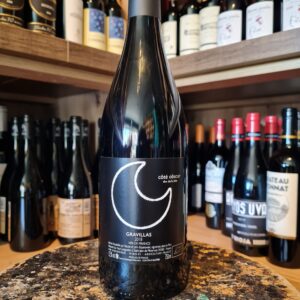 A typical blend of almost century-old Carignan and Cabernet Sauvignon. The vineyard is treated with respect, neither chemicals nor weed killers are tolerated, in order to preserve the biodiversity of the surrounding flora and fauna. The favourable terroir of white limestone pebbles, combined with low yields, gives mineral wines, with a beautiful freshness , and concentrated fruit. Manual harvest in 15 kg crates with severe sorting in the vineyard. 3 weeks pellicular maceration which brings a lot of fullness. We will find the aromatic complexity of Carignan with some notes of pepper and a tannic structure provided by the Cabernet. the tannins are nevertheless very fine. Pair this Coté Obscur wine with beef entrecote, duck skewer and some soft cheese. A real treat! Would recommend to decant this for at least an hour.
A typical blend of almost century-old Carignan and Cabernet Sauvignon. The vineyard is treated with respect, neither chemicals nor weed killers are tolerated, in order to preserve the biodiversity of the surrounding flora and fauna. The favourable terroir of white limestone pebbles, combined with low yields, gives mineral wines, with a beautiful freshness , and concentrated fruit. Manual harvest in 15 kg crates with severe sorting in the vineyard. 3 weeks pellicular maceration which brings a lot of fullness. We will find the aromatic complexity of Carignan with some notes of pepper and a tannic structure provided by the Cabernet. the tannins are nevertheless very fine. Pair this Coté Obscur wine with beef entrecote, duck skewer and some soft cheese. A real treat! Would recommend to decant this for at least an hour. -
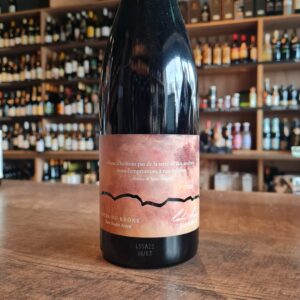 Vincent Rochette comes from a long line of grape growers rather than winemakers. In 1998, he bucked that trend by investing in a cellar and the necessary equipment to allow him to vinify his own grapes, which for five generations had been sold to other winemakers in the area. Vincent is an ardent believer in the benefits of biodynamics, fully converting his estate to follow that philosophy in 2006. He uses only natural products in the vineyard and carries out all his work in keeping with the cosmic cycles of the earth, not only among the vines but also in the cellar. One of his most interesting cuvées is the Côte du Rhone ‘Nature’, which has had no sulphites added at any stage of the winemaking process. Due to the fact that sulphites are naturally present in grapes, there are still 9mg present (below the legal 10mg limit which is required to state that the wine contains sulphites). The result is a wine that is simply a pure expression of Grenache and Syrah. Harvesting, racking and bottling are all carried out in accordance with cosmic rhythms. A delicious wine to consume today, with grills, summer salads, spicy dishes such as couscous, a tagine with candied fruits (apricots, lemons, onions, etc.)
Vincent Rochette comes from a long line of grape growers rather than winemakers. In 1998, he bucked that trend by investing in a cellar and the necessary equipment to allow him to vinify his own grapes, which for five generations had been sold to other winemakers in the area. Vincent is an ardent believer in the benefits of biodynamics, fully converting his estate to follow that philosophy in 2006. He uses only natural products in the vineyard and carries out all his work in keeping with the cosmic cycles of the earth, not only among the vines but also in the cellar. One of his most interesting cuvées is the Côte du Rhone ‘Nature’, which has had no sulphites added at any stage of the winemaking process. Due to the fact that sulphites are naturally present in grapes, there are still 9mg present (below the legal 10mg limit which is required to state that the wine contains sulphites). The result is a wine that is simply a pure expression of Grenache and Syrah. Harvesting, racking and bottling are all carried out in accordance with cosmic rhythms. A delicious wine to consume today, with grills, summer salads, spicy dishes such as couscous, a tagine with candied fruits (apricots, lemons, onions, etc.) -
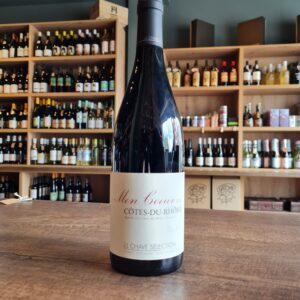 Domaine Jean-Louis Chave is one of the finest producers in the Northern Rhone. 16 generations of wine making has led to mastery of their art. This astonishing experience and expertise is pervasive in this wine. This deliciously ripe Syrah/Grenache blend has a wonderful core of dark, berry fruit supported by a framework of ripe tannin with cooling, granitic notes and a sleek, sophisticated texture. The sublime quality of the wines at this Domaine have meant that there has always been a long queue of Wine Merchants desperate for a glimpse of the Chave cellars. Gerard's son, Jean-Louis makes the wine at the Estate now and his ideal is to produce wine that is as pure an expression of the grape and terroir as possible. He achieves this by only vinifying the healthiest grapes produced from low yielding vines, intervening as little as possible while making the wine and bottling without filtration. His wines are some of the Rhône’s most complete and sophisticated examples. Jean Louis Chaves' selection wines are benchmarks of the Rhone, packed with regional character, that are made from a mixture of declassified Domaine fruit and grapes that are grown by Jean-Louis in conjunction with other vignobles. After tasting this gorgeous wine, I understood the name "Mon Coeur".
Domaine Jean-Louis Chave is one of the finest producers in the Northern Rhone. 16 generations of wine making has led to mastery of their art. This astonishing experience and expertise is pervasive in this wine. This deliciously ripe Syrah/Grenache blend has a wonderful core of dark, berry fruit supported by a framework of ripe tannin with cooling, granitic notes and a sleek, sophisticated texture. The sublime quality of the wines at this Domaine have meant that there has always been a long queue of Wine Merchants desperate for a glimpse of the Chave cellars. Gerard's son, Jean-Louis makes the wine at the Estate now and his ideal is to produce wine that is as pure an expression of the grape and terroir as possible. He achieves this by only vinifying the healthiest grapes produced from low yielding vines, intervening as little as possible while making the wine and bottling without filtration. His wines are some of the Rhône’s most complete and sophisticated examples. Jean Louis Chaves' selection wines are benchmarks of the Rhone, packed with regional character, that are made from a mixture of declassified Domaine fruit and grapes that are grown by Jean-Louis in conjunction with other vignobles. After tasting this gorgeous wine, I understood the name "Mon Coeur". -
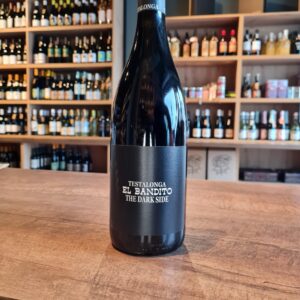 The El Bandito The Dark Side 2017 by Testalonga comes from Shiraz vineyards from the early 2000s - the vines are still in full bloom, but thanks to the low yield, they are already delivering phenolic grapes. The vineyards are cultivated by Craig with no herbicites, pesticides or fungicites. He also does without artificial irrigation. These measures alone have a positive effect on the quality of the grapes and keep the yield low. After hand-picking, the grapes are fermented spontaneously with the vineyard's own yeast and matured in 3000l wooden barrels. After expansion, it is neither fined nor filtered and filled with minimal sulfur. The Testalonga El Bandito The Dark Side has a deep dark color with a black core. It smells of red berries and dark stone fruits, of cloves, mocha and cocoa beans as well as tart spiciness. On the palate it has a present tannin and a fine interplay of acids. In terms of alcohol, the Shiraz is quite slim and straight, but still brings a weighty body into play. The finish is long and dominated by the heavier aromas. The El Bandito The Dark Side Shiraz demands air, so give it a few hours in the carafe before serving it slightly chilled from large glasses with roasted game, braised lamb or an oven-baked bean stew with roasted butter crumbs and thyme.
The El Bandito The Dark Side 2017 by Testalonga comes from Shiraz vineyards from the early 2000s - the vines are still in full bloom, but thanks to the low yield, they are already delivering phenolic grapes. The vineyards are cultivated by Craig with no herbicites, pesticides or fungicites. He also does without artificial irrigation. These measures alone have a positive effect on the quality of the grapes and keep the yield low. After hand-picking, the grapes are fermented spontaneously with the vineyard's own yeast and matured in 3000l wooden barrels. After expansion, it is neither fined nor filtered and filled with minimal sulfur. The Testalonga El Bandito The Dark Side has a deep dark color with a black core. It smells of red berries and dark stone fruits, of cloves, mocha and cocoa beans as well as tart spiciness. On the palate it has a present tannin and a fine interplay of acids. In terms of alcohol, the Shiraz is quite slim and straight, but still brings a weighty body into play. The finish is long and dominated by the heavier aromas. The El Bandito The Dark Side Shiraz demands air, so give it a few hours in the carafe before serving it slightly chilled from large glasses with roasted game, braised lamb or an oven-baked bean stew with roasted butter crumbs and thyme. -
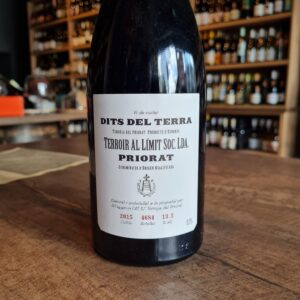 The wine Priorat Dits del Terra is a red wine produced in the Catalunya region, more precisely Priorat or the Torroja del Priorat in Spain, by Terroir al Limit. The vineyards are south facing in the sun-baked slate hills of Priorat and 60+ year old carignan vines are not usually harbingers of floral elegance and silken grace. And yet this gap between expectation and stunning creation is precisely what makes Dits de Terra so iconic. The vineyard, one of the original Terroir Al Limit holdings, honors the Cyprus trees that shade the historic Eremitas throughout the region. It is crafted using whole bunch fermentation and initial vinification in cement, then afforded a rare gift: time, in the form of 16 months in Stockinger foudres and cement, with a gentle and unobtrusive elevage. This care and attention elevates it into a fine, complex and fluid expression of different terroirs. The dark depths in the glass belie its ephemeral lightness in aroma and flavor. Breathy black fruits and a persistent herbality enhance the supple spice and suspended movement across the palate. Anise, fresh fennel and rose notes are underscored with a fluid web of balsamic accents - never weighty nor wide. The wine exudes gravitas with the elegant confidence that comes only from complete comfort in one’s own skin. Only 2000 bottles produced, Masterclass of a wine!
The wine Priorat Dits del Terra is a red wine produced in the Catalunya region, more precisely Priorat or the Torroja del Priorat in Spain, by Terroir al Limit. The vineyards are south facing in the sun-baked slate hills of Priorat and 60+ year old carignan vines are not usually harbingers of floral elegance and silken grace. And yet this gap between expectation and stunning creation is precisely what makes Dits de Terra so iconic. The vineyard, one of the original Terroir Al Limit holdings, honors the Cyprus trees that shade the historic Eremitas throughout the region. It is crafted using whole bunch fermentation and initial vinification in cement, then afforded a rare gift: time, in the form of 16 months in Stockinger foudres and cement, with a gentle and unobtrusive elevage. This care and attention elevates it into a fine, complex and fluid expression of different terroirs. The dark depths in the glass belie its ephemeral lightness in aroma and flavor. Breathy black fruits and a persistent herbality enhance the supple spice and suspended movement across the palate. Anise, fresh fennel and rose notes are underscored with a fluid web of balsamic accents - never weighty nor wide. The wine exudes gravitas with the elegant confidence that comes only from complete comfort in one’s own skin. Only 2000 bottles produced, Masterclass of a wine! -
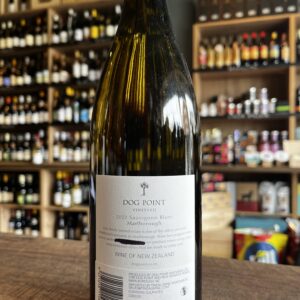
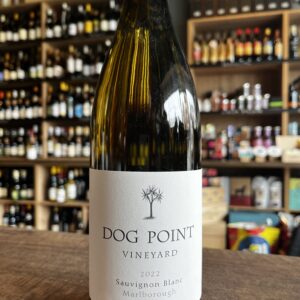 Dog Point Vineyard is New Zealand's largest certified organic vineyard by Biogro NZ. We are family owned and one of the oldest privately established vineyards, located on the hill slopes of the Southern Valleys of Marlborough, New Zealand. Marlborough is blessed with one of the sunniest and driest climates in New Zealand. The significant diurnal temperature range between cool nights and sunny days allows ideal conditions for the long slow ripening of grapes. Soils are crucial to the character of our wine. Most soils have been laid down within the last 14,000 years carved and eroded by glaciers in the high country and carried down to the coast by melt-water rivers. Older well-established vines are situated on free draining silty clay loams. This is supplemented with more recent plantings on closely planted hillside blocks on soils with a clay loam influence. Pair with fresh, simple seafood dishes especially oysters. Also compliments goat's cheese well
Dog Point Vineyard is New Zealand's largest certified organic vineyard by Biogro NZ. We are family owned and one of the oldest privately established vineyards, located on the hill slopes of the Southern Valleys of Marlborough, New Zealand. Marlborough is blessed with one of the sunniest and driest climates in New Zealand. The significant diurnal temperature range between cool nights and sunny days allows ideal conditions for the long slow ripening of grapes. Soils are crucial to the character of our wine. Most soils have been laid down within the last 14,000 years carved and eroded by glaciers in the high country and carried down to the coast by melt-water rivers. Older well-established vines are situated on free draining silty clay loams. This is supplemented with more recent plantings on closely planted hillside blocks on soils with a clay loam influence. Pair with fresh, simple seafood dishes especially oysters. Also compliments goat's cheese well -
Out of stock
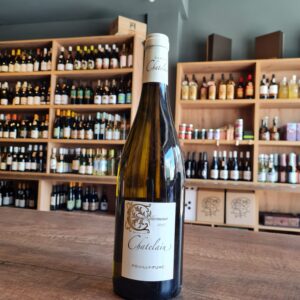 The Chatelain family has worked the vineyards of Pouilly-sur-Loire since the 1630s. Today the family farm is run by Jean-Claude and Geneviève Chatelain, the 11th generation of winemakers from Domaine Chatelain. The grapes for Les Chailloux are grown on the St. Andelain Hill with its clay and siliceous soils strewn with pebbles and flint; the wine is aged ‘sur lie’ prior to bottling in the spring. Light yellow-gold; the wine is vivid, aromatic and minerally on the nose, followed by a spicy flint (silex) character on the palate.
The Chatelain family has worked the vineyards of Pouilly-sur-Loire since the 1630s. Today the family farm is run by Jean-Claude and Geneviève Chatelain, the 11th generation of winemakers from Domaine Chatelain. The grapes for Les Chailloux are grown on the St. Andelain Hill with its clay and siliceous soils strewn with pebbles and flint; the wine is aged ‘sur lie’ prior to bottling in the spring. Light yellow-gold; the wine is vivid, aromatic and minerally on the nose, followed by a spicy flint (silex) character on the palate. -
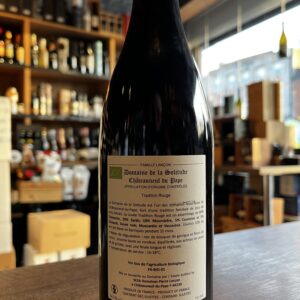
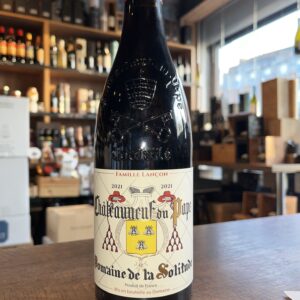 This domain has one of the best terroirs in Châteauneuf-du-Pape with its abundance of rounded quartzite stones from the Villafranchian period. These stones absorb heat during the day then radiate it at night, promoting full grape maturity. Yielding just 30 hectolitres per hectare, the vines are carefully managed throughout the year. The grapes are hand-harvested, once each variety has reached full maturity, which is based on tastings undertaken by an expert panel. The vineyard is farmed sustainably according to the principles of la lutte raisonnée.
This domain has one of the best terroirs in Châteauneuf-du-Pape with its abundance of rounded quartzite stones from the Villafranchian period. These stones absorb heat during the day then radiate it at night, promoting full grape maturity. Yielding just 30 hectolitres per hectare, the vines are carefully managed throughout the year. The grapes are hand-harvested, once each variety has reached full maturity, which is based on tastings undertaken by an expert panel. The vineyard is farmed sustainably according to the principles of la lutte raisonnée. -
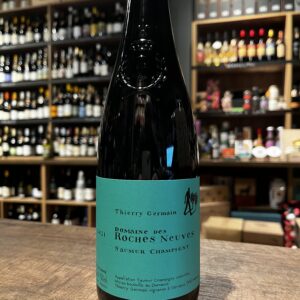 The 50-hectare Domaine des Roches Neuves is run by Bordelais Thierry Germain who originally was from Bordeaux and is situated in the appellation of Saumur-Champigny. The winery has existed since 1850, and since purchasing the estate in 1991, Thierry run it with such incredible will and tenacity that turned Domaine des Roches Neuves into one of the finest wineries/farms in France. Not to forget it wasn't without the help of his mentor and spiritual father Charly Foucault of Clos Rougeard The estate is run strictly along biodynamic lines, harvesting is manual and yields are low. This stunning wine pairs well with pork rillettes, lamb shank confit, grilled artichokes. Try it with just cheeses and charcuterie
The 50-hectare Domaine des Roches Neuves is run by Bordelais Thierry Germain who originally was from Bordeaux and is situated in the appellation of Saumur-Champigny. The winery has existed since 1850, and since purchasing the estate in 1991, Thierry run it with such incredible will and tenacity that turned Domaine des Roches Neuves into one of the finest wineries/farms in France. Not to forget it wasn't without the help of his mentor and spiritual father Charly Foucault of Clos Rougeard The estate is run strictly along biodynamic lines, harvesting is manual and yields are low. This stunning wine pairs well with pork rillettes, lamb shank confit, grilled artichokes. Try it with just cheeses and charcuterie -
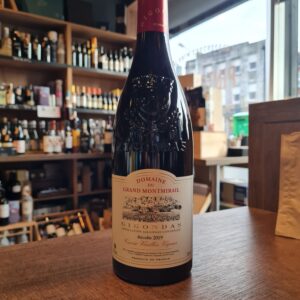 Domaine du Grand Montmirail Gigondas lies in the foothills of a limestone escarpment in a remote part of Gigondas. A blend of Grenache, Syrah and Mourvedre, this wine has real depth of flavour with concentrated black fruits balanced by fresh acidity and a rich warm finish. In Gigondas, cultivating grapes to make wine and olives to make oil stretches back to ancient times. As long ago as the 1st century, Julius Caesar established a colony of veterans on this site. One is said to have been so jovial that he was nicknamed Jucundus, 'the joyful', and his village became known as Jocundatis, which later became Gigondas. Domain du Grand Montmirail covers more than 35 Ha, planted exclusively on the hillsides and terraces located south / south-east side of the Dentelles de Montmirail, forming a superb amphitheater dedicated to the vine and the wine. The altitude of the vineyard varies between 300 and 350 meters and enjoys natural protection against the wind dominating the mistral. The vineyard is composed of Grenache, Syrah and Mourvèdre parcels, aged between 15 and 65 years. The harvest begins with Syrah, the quickest grape to ripen, and then the Grenache in the highest spots. The Mourvèdre is the slowest ripening and usually the last grape to be harvested. The entire harvest is picked by hand, and yields are never more than 35 hl/ha. Among the old vines on the terraces, they generally fall to a maximum of 30 hl/ha. The recently picked grapes are transported quickly to the winery situated off to the side of the vineyards. Pair it with Beef, Casserole, Lamb, Mushrooms
Domaine du Grand Montmirail Gigondas lies in the foothills of a limestone escarpment in a remote part of Gigondas. A blend of Grenache, Syrah and Mourvedre, this wine has real depth of flavour with concentrated black fruits balanced by fresh acidity and a rich warm finish. In Gigondas, cultivating grapes to make wine and olives to make oil stretches back to ancient times. As long ago as the 1st century, Julius Caesar established a colony of veterans on this site. One is said to have been so jovial that he was nicknamed Jucundus, 'the joyful', and his village became known as Jocundatis, which later became Gigondas. Domain du Grand Montmirail covers more than 35 Ha, planted exclusively on the hillsides and terraces located south / south-east side of the Dentelles de Montmirail, forming a superb amphitheater dedicated to the vine and the wine. The altitude of the vineyard varies between 300 and 350 meters and enjoys natural protection against the wind dominating the mistral. The vineyard is composed of Grenache, Syrah and Mourvèdre parcels, aged between 15 and 65 years. The harvest begins with Syrah, the quickest grape to ripen, and then the Grenache in the highest spots. The Mourvèdre is the slowest ripening and usually the last grape to be harvested. The entire harvest is picked by hand, and yields are never more than 35 hl/ha. Among the old vines on the terraces, they generally fall to a maximum of 30 hl/ha. The recently picked grapes are transported quickly to the winery situated off to the side of the vineyards. Pair it with Beef, Casserole, Lamb, Mushrooms -
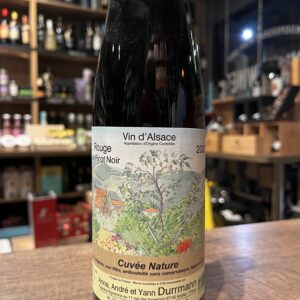 This wine is imported exclusively for Pinto Wines. The Durrmann estate is located in the municipality of Andlau, in Alsace, an ancient medieval village in which vines have been cultivated for more than a thousand years. The winery was created in 1979 with some vineyards owned by Yann's grandfather, who was a shoemaker. The lack of experience in the wine sector was a disadvantage as they had to start from scratch, but also a big advantage as they were able to immediately differentiate themselves from tradition and move towards the most natural agriculture possible with a push "of thought "very innovative. As André expanded the domain into what it is today and managed to collect a beautiful vineyard property (more than 8 hectares now), he been working completely organically since 1998, but he also applies permaculture principles to achieve the greatest possible biodiversity in the vineyards. For example, he planted trees among the grapes. He does not plow the vineyards, because he thinks that would disrupt soil life. At most he mows the grass. In winter he lets his own small flock of sheep graze the vineyards. To keep it within the vineyard, he has fenced off all his plots with mesh and fences; This also helps to keep wild boars - which appear to have a great preference for organic vineyards! - at bay. André cruises through the village in an electric car, powered by electricity he produces himself (because he refuses to use electricity from a nuclear power plant). His wife Anna cooks vegetables and potatoes on two large dishes in the courtyard that catch the sunlight and heat the pans. Anyway, you get the picture. Son Yann has now taken over the domain and more and more cuvées are now made completely naturally. Not filtered, and without added sulfite. They also still make some cuvées with sulphite, because they do not want to alienate the large private customer base that buys at the door. But most customers respond positively, so they will steadily expand the nature range. Even Rieslings from Grand Cru vineyards are now being marketed as natural wine. Taste this next to the sulfited version and you will notice that the terroir in the natural version comes out even better! Perfect at room temperature in the winter, slightly chill it in the summer. Serve with white meat or light nibbles or on its own!!Delicious and to come back for more
This wine is imported exclusively for Pinto Wines. The Durrmann estate is located in the municipality of Andlau, in Alsace, an ancient medieval village in which vines have been cultivated for more than a thousand years. The winery was created in 1979 with some vineyards owned by Yann's grandfather, who was a shoemaker. The lack of experience in the wine sector was a disadvantage as they had to start from scratch, but also a big advantage as they were able to immediately differentiate themselves from tradition and move towards the most natural agriculture possible with a push "of thought "very innovative. As André expanded the domain into what it is today and managed to collect a beautiful vineyard property (more than 8 hectares now), he been working completely organically since 1998, but he also applies permaculture principles to achieve the greatest possible biodiversity in the vineyards. For example, he planted trees among the grapes. He does not plow the vineyards, because he thinks that would disrupt soil life. At most he mows the grass. In winter he lets his own small flock of sheep graze the vineyards. To keep it within the vineyard, he has fenced off all his plots with mesh and fences; This also helps to keep wild boars - which appear to have a great preference for organic vineyards! - at bay. André cruises through the village in an electric car, powered by electricity he produces himself (because he refuses to use electricity from a nuclear power plant). His wife Anna cooks vegetables and potatoes on two large dishes in the courtyard that catch the sunlight and heat the pans. Anyway, you get the picture. Son Yann has now taken over the domain and more and more cuvées are now made completely naturally. Not filtered, and without added sulfite. They also still make some cuvées with sulphite, because they do not want to alienate the large private customer base that buys at the door. But most customers respond positively, so they will steadily expand the nature range. Even Rieslings from Grand Cru vineyards are now being marketed as natural wine. Taste this next to the sulfited version and you will notice that the terroir in the natural version comes out even better! Perfect at room temperature in the winter, slightly chill it in the summer. Serve with white meat or light nibbles or on its own!!Delicious and to come back for more -
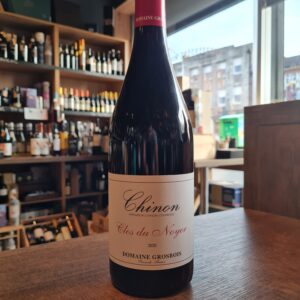 Located on the right bank of the Vienne Valley, between Tours and Saumur, Domaine Grosbois is an old fortified farm built in the 15th century which today covers 20 hectares of vines. Now run by two brothers, Nicolas and Sylvain, the family vineyards are located at a place called “The Pressoir” Panzoult in the Chinon appellation at the heart of the Loire Valley. The winemaking here is concentrated solely on the production of red wines made from the Cabernet Franc grape. Nicolas has been at the domaine since 2005 after returning from ten years working as a travelling winemaker, gaining experience in locations as diverse as the Minervois, Chile, Oregon (Adelsheim), Australia (Brokenwood) and New Zealand (Pegasus Bay). His first vintage was in 2006 where he worked alongside his father, Jacques (who had previously been more inclined to sell off the production in cubitainer). Jacques retired, or at least withdrew, in 2008 allowing Nicolas to develop the domaine in the way he intended to continue, converting to organic and biodynamic viticulture. The winemaking philosophy at Grosbois is centred around the idea of micro-site specificity with the various Cabernet Franc bottling's reflecting the 19 unique plots of vines on the Panzoult Hill, all of which had been strategically planted according to their geological characteristics. Once in the cellar, Nicolas lets the grapes speak for themselves, keeping a light hand at winemaking. He ferments in open concrete tanks with indigenous yeast, uses no oak and minimal filtration, so what you find in the final wine is a pure expression of a teeny parcel of Chinon. Pair it with roast duck with peppers. Serve after slight aeration
Located on the right bank of the Vienne Valley, between Tours and Saumur, Domaine Grosbois is an old fortified farm built in the 15th century which today covers 20 hectares of vines. Now run by two brothers, Nicolas and Sylvain, the family vineyards are located at a place called “The Pressoir” Panzoult in the Chinon appellation at the heart of the Loire Valley. The winemaking here is concentrated solely on the production of red wines made from the Cabernet Franc grape. Nicolas has been at the domaine since 2005 after returning from ten years working as a travelling winemaker, gaining experience in locations as diverse as the Minervois, Chile, Oregon (Adelsheim), Australia (Brokenwood) and New Zealand (Pegasus Bay). His first vintage was in 2006 where he worked alongside his father, Jacques (who had previously been more inclined to sell off the production in cubitainer). Jacques retired, or at least withdrew, in 2008 allowing Nicolas to develop the domaine in the way he intended to continue, converting to organic and biodynamic viticulture. The winemaking philosophy at Grosbois is centred around the idea of micro-site specificity with the various Cabernet Franc bottling's reflecting the 19 unique plots of vines on the Panzoult Hill, all of which had been strategically planted according to their geological characteristics. Once in the cellar, Nicolas lets the grapes speak for themselves, keeping a light hand at winemaking. He ferments in open concrete tanks with indigenous yeast, uses no oak and minimal filtration, so what you find in the final wine is a pure expression of a teeny parcel of Chinon. Pair it with roast duck with peppers. Serve after slight aeration -
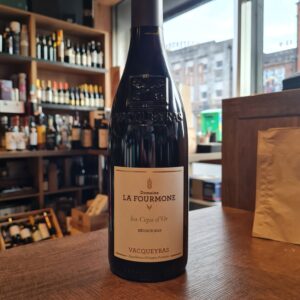 Domaine la Fourmone is a multi-generational domaine and is currently run by sister, Florentine and brother, Albin Combe. The property dates back to the mid-1700’s when it originally producing wheat. Wine began to be grown in the last 19th century and thent became the crop after Julien Combe purchased the property in 1910. The domaine cultivates 41 ha (104 acres) of vineyards of which, 20ha are in Vacqueyras, 10ha are in Gigondas and 7ha of Côtes-du-Rhône and IGP and 4ha of vines on the southern edge of the Dentelles hills that reside in the Ventoux appellation. “Les Ceps d’Or” comes from a blend of mainly Grenache and Mourvèdre. It expresses the imprint of the 50 years of our goblet-pruned vines. The berries are delicately harvested on the northern and eastern limits of the Vacqueyras appellation. The plots come from two islands located on the plateau of the appellation at the foothills of the Dentelles de Montmirail, a massif well known for its geological richness. The first islet is located in the Piedmont de Beauregard region. The soil is made up of dark beige marly silts, cut by broken slabs of Miocene molasses at a depth of one meter. This terroir requires a lot of effort from the vines to slide their rootlets into the cracks and deploy meters of roots. This effort gives the wine a singular complexity and aromatic richness. The second islet is located at the northern limit of the Cône de la Font des Papes terroir. A surface of light beige clay-sandy silt with small limestone fragments with a well-developed root profile up to two meters deep. The materials from this terroir have all the criteria favorable to the vine: freshness and good water reserve.
Domaine la Fourmone is a multi-generational domaine and is currently run by sister, Florentine and brother, Albin Combe. The property dates back to the mid-1700’s when it originally producing wheat. Wine began to be grown in the last 19th century and thent became the crop after Julien Combe purchased the property in 1910. The domaine cultivates 41 ha (104 acres) of vineyards of which, 20ha are in Vacqueyras, 10ha are in Gigondas and 7ha of Côtes-du-Rhône and IGP and 4ha of vines on the southern edge of the Dentelles hills that reside in the Ventoux appellation. “Les Ceps d’Or” comes from a blend of mainly Grenache and Mourvèdre. It expresses the imprint of the 50 years of our goblet-pruned vines. The berries are delicately harvested on the northern and eastern limits of the Vacqueyras appellation. The plots come from two islands located on the plateau of the appellation at the foothills of the Dentelles de Montmirail, a massif well known for its geological richness. The first islet is located in the Piedmont de Beauregard region. The soil is made up of dark beige marly silts, cut by broken slabs of Miocene molasses at a depth of one meter. This terroir requires a lot of effort from the vines to slide their rootlets into the cracks and deploy meters of roots. This effort gives the wine a singular complexity and aromatic richness. The second islet is located at the northern limit of the Cône de la Font des Papes terroir. A surface of light beige clay-sandy silt with small limestone fragments with a well-developed root profile up to two meters deep. The materials from this terroir have all the criteria favorable to the vine: freshness and good water reserve. -
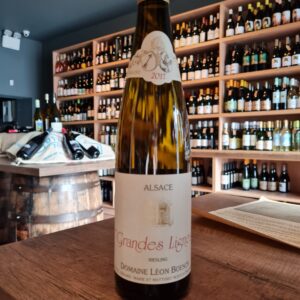 The Boesch domaine is located within the Vallèe Noble, in the “Ballons des Vosges” natural park. A magical place, surrounded by splendid vineyards at the foot of the two highest mountains of the Vosges range. The Boesch family has lived there and worked the land since 1640. 25 year old biodynamic vines planted in a limestone and sandstone-clay soil on an east facing hillside give this delicious wine. This wine is the subject of evident care: ploughing, natural treatments, and the vines are fertilized with compost produced on the estate. The harvest, the highlight of the year, is carried out exclusively by hand, and fermentation takes place with indigenous yeasts in oak casks. The nose is characterized by rhubarb, apricot, anise and gingerbread. On the palate it is very clean. Definitely a great Riesling.
The Boesch domaine is located within the Vallèe Noble, in the “Ballons des Vosges” natural park. A magical place, surrounded by splendid vineyards at the foot of the two highest mountains of the Vosges range. The Boesch family has lived there and worked the land since 1640. 25 year old biodynamic vines planted in a limestone and sandstone-clay soil on an east facing hillside give this delicious wine. This wine is the subject of evident care: ploughing, natural treatments, and the vines are fertilized with compost produced on the estate. The harvest, the highlight of the year, is carried out exclusively by hand, and fermentation takes place with indigenous yeasts in oak casks. The nose is characterized by rhubarb, apricot, anise and gingerbread. On the palate it is very clean. Definitely a great Riesling. -
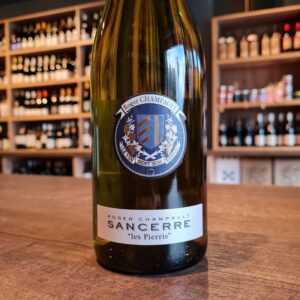 Five generations of traditional winemaking from the estate of Roger Champault, modern thermoregulation techniques, and carefully chosen soil matching, have produced a Cuvee that is subtle at first, like the rising of a summer breeze, building in its complexity with wispy herbal notes and abundant florals that dance across the taste buds like wind through an apple orchard. Delicate, yet so very alive. This wine drinks with a lovely, masterfully structured liveliness and sweet, concentrated finish.Thanks to its abundant fruitiness, it is suitable not only for seafood and crabs but also for more abundant fish dishes; fried salmon, pike perch etc. Also suitable for light meat, especially poultry dishes.Curious note, Sancerre Les Pierris 2008 wine was served at the wedding dinner of Princess Victoria and Daniel of Sweden.
Five generations of traditional winemaking from the estate of Roger Champault, modern thermoregulation techniques, and carefully chosen soil matching, have produced a Cuvee that is subtle at first, like the rising of a summer breeze, building in its complexity with wispy herbal notes and abundant florals that dance across the taste buds like wind through an apple orchard. Delicate, yet so very alive. This wine drinks with a lovely, masterfully structured liveliness and sweet, concentrated finish.Thanks to its abundant fruitiness, it is suitable not only for seafood and crabs but also for more abundant fish dishes; fried salmon, pike perch etc. Also suitable for light meat, especially poultry dishes.Curious note, Sancerre Les Pierris 2008 wine was served at the wedding dinner of Princess Victoria and Daniel of Sweden. -
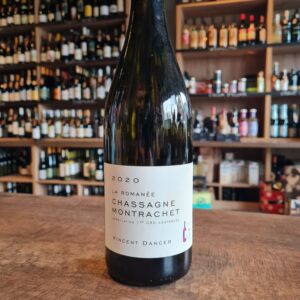 Vincent Dancer grew up in Alsace, where he inherited a love of wine and photography from his father. After studying engineering, his father suggested that Vincent spend some time in Burgundy, where his family owned some vines that were being rented out to cousins. Dancer was immediately hooked, and decided to settle in Chassagne-Montrachet and make wine from the five hectares of well-situated vineyards. The winery is small even by the standards of Burgundy, and despite Dancer’s reclusive nature, the wines are well known to a small circle of restaurateurs and wine-lovers who reliably take their miniscule allocation year after year. Dancer was the first producer in Chassagne to become certified organic, and there remains less than a handful of others. He is quietly individualistic, creating his own lean, bright, and savory style of wines, trusting his instincts and experience to make the best possible wine in his own way. Each cuvée, however, is truly a reflection of the terroir—from the rich, unctuous Meursault Perrières to the incisively fresh Chassagne Tête du Clos. It is not an exaggeration to say that the wines from Vincent Dancer are majestically unique, exceptionally delicious, and well worth the effort of seeking out.
Vincent Dancer grew up in Alsace, where he inherited a love of wine and photography from his father. After studying engineering, his father suggested that Vincent spend some time in Burgundy, where his family owned some vines that were being rented out to cousins. Dancer was immediately hooked, and decided to settle in Chassagne-Montrachet and make wine from the five hectares of well-situated vineyards. The winery is small even by the standards of Burgundy, and despite Dancer’s reclusive nature, the wines are well known to a small circle of restaurateurs and wine-lovers who reliably take their miniscule allocation year after year. Dancer was the first producer in Chassagne to become certified organic, and there remains less than a handful of others. He is quietly individualistic, creating his own lean, bright, and savory style of wines, trusting his instincts and experience to make the best possible wine in his own way. Each cuvée, however, is truly a reflection of the terroir—from the rich, unctuous Meursault Perrières to the incisively fresh Chassagne Tête du Clos. It is not an exaggeration to say that the wines from Vincent Dancer are majestically unique, exceptionally delicious, and well worth the effort of seeking out. -
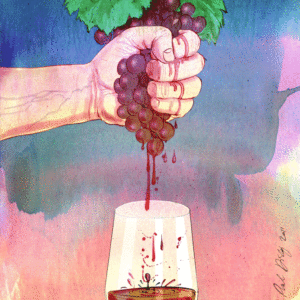 More and more wine producers are adopting organic winemaking as the way forward, and they are stunning wines out there. There are many reasons why people enjoy organic wines. For some, it became a way of life, for others it just “feels right”. The old fear ''I don't trust organic wines'' or ''They all taste the same'' is disappearing, with more people converting to organic wines as there is more knowledge, greater quality and a heavily regulated market that will certify these wines. We brought you a case for any occasion with easy drinking 6 bottles. They say natural wine can be tricky to understand, well no expertise needed with these wines. An essential mix of light, low sulphite, crisp fresh white and a soft, pleasurable red. All organic, all vegan, all tasty. No need to drown in the complexity of natural wine, just try these and enjoy. Bardos Rueda Verdejo - This artisan verdejo is part of the reason the Spanish Rueda region has become quite popular. Made unapologetically, you will find yourself like a true “Bard” drinking this wine. Delicious! Sepp Gruner Veltliner - All Sepp Moser wines have been organic (and all estate wines biodynamic) since 2007. Delicate aromas of pear, kiwi, apricot and white spice. On the palate stone fruit flavours and white pepper lead to a gently textured, mineral and citrus finish. Combel La Serre L'Epatant Antidote Rosé - 100% French Malbec (known in Cahors as Auxerrois). The vines are 40 years old, grown on clay and limestone soils. Fermentation and aging take place in small tanks."The Splendid Antidote to the Heat of the Causse" is the amusing and appropriate name of this refreshing rosé. (The Causse is the high limestone plateau around Cahors, which gets brutally hot in the summer.) The wine shows a pretty pink/orange color and aromas of ripe cherry, raspberry and cassis with citrus and spice. It precedes a palate that is both fleshy, suave and savory, with formidable gluttony. Both easy and winey, it's an absolute delight! Roche-Audran, ‘Nature’ Còtes-du-Rhône - Vincent Rochette comes from a long line of grape growers rather than winemakers up until 1998 when he bucked that trend by investing in a cellar and the necessary equipment to allow him to vinify his own grapes . He uses only natural products in the vineyard and carries out all his work in keeping with the cosmic cycles of the earth, not only among the vines but also in the cellar. One of his most interesting cuvées is the Côte du Rhone ‘Nature’, which has had no sulphites added at any stage of the winemaking process. Due to the fact that sulphites are naturally present in grapes, there are still 9mg present (below the legal 10mg limit which is required to state that the wine contains sulphites), an insignificant figure compared to the conventional levels found in most wines. The result is a wine that is simply a pure expression of Grenache, Carignan, Syrah and Mourvèdre. Harvesting, racking and bottling are all carried out in accordance with cosmic rhythms. Pitti Pittnauer Red - High on the hills of Austria there is more than just a lonely goat herd – there is also a fantastic winery, considered one of the country’s best. Pittnauer has a long winemaking tradition in the region, and in 2006 moved to more biodynamic practices. The results are delicious, environmentally friendly wines with years of experience behind them. Now prepare yourself for some varieties you’ve probably never heard of – Pittnauer’s Pitti Red Blend is made from blaufränkisch and Zweigelt grapes with a small quantity of Merlot added to the mixture. Filipa Pato Dinâmica Baga 2019 - Filipa Pato is the confirmation of the old saying "son of fish knows how to swim". Although she followed the footsteps of her father Luís Pato, Filipa went on her own and started a project in 2001. The success was immediate, and soon she rose to the status of one of the most brilliant winemakers in Portugal. Her wines are the result of Filipa's innovative and brilliant spirit. They were quickly at the forefront of national and international criticism. Dinâmica Baga is a wine that, due to its proximity to the sea, presents an intense, complex and elegant aroma with a touch of fruit such as strawberry and plum, nuances of liquorice and notes of spices such as black pepper, bay leaves and thyme, and balanced acidity. In the mouth it is fruity, with a beautiful structure and velvety texture, with a very fresh and inviting finish.
More and more wine producers are adopting organic winemaking as the way forward, and they are stunning wines out there. There are many reasons why people enjoy organic wines. For some, it became a way of life, for others it just “feels right”. The old fear ''I don't trust organic wines'' or ''They all taste the same'' is disappearing, with more people converting to organic wines as there is more knowledge, greater quality and a heavily regulated market that will certify these wines. We brought you a case for any occasion with easy drinking 6 bottles. They say natural wine can be tricky to understand, well no expertise needed with these wines. An essential mix of light, low sulphite, crisp fresh white and a soft, pleasurable red. All organic, all vegan, all tasty. No need to drown in the complexity of natural wine, just try these and enjoy. Bardos Rueda Verdejo - This artisan verdejo is part of the reason the Spanish Rueda region has become quite popular. Made unapologetically, you will find yourself like a true “Bard” drinking this wine. Delicious! Sepp Gruner Veltliner - All Sepp Moser wines have been organic (and all estate wines biodynamic) since 2007. Delicate aromas of pear, kiwi, apricot and white spice. On the palate stone fruit flavours and white pepper lead to a gently textured, mineral and citrus finish. Combel La Serre L'Epatant Antidote Rosé - 100% French Malbec (known in Cahors as Auxerrois). The vines are 40 years old, grown on clay and limestone soils. Fermentation and aging take place in small tanks."The Splendid Antidote to the Heat of the Causse" is the amusing and appropriate name of this refreshing rosé. (The Causse is the high limestone plateau around Cahors, which gets brutally hot in the summer.) The wine shows a pretty pink/orange color and aromas of ripe cherry, raspberry and cassis with citrus and spice. It precedes a palate that is both fleshy, suave and savory, with formidable gluttony. Both easy and winey, it's an absolute delight! Roche-Audran, ‘Nature’ Còtes-du-Rhône - Vincent Rochette comes from a long line of grape growers rather than winemakers up until 1998 when he bucked that trend by investing in a cellar and the necessary equipment to allow him to vinify his own grapes . He uses only natural products in the vineyard and carries out all his work in keeping with the cosmic cycles of the earth, not only among the vines but also in the cellar. One of his most interesting cuvées is the Côte du Rhone ‘Nature’, which has had no sulphites added at any stage of the winemaking process. Due to the fact that sulphites are naturally present in grapes, there are still 9mg present (below the legal 10mg limit which is required to state that the wine contains sulphites), an insignificant figure compared to the conventional levels found in most wines. The result is a wine that is simply a pure expression of Grenache, Carignan, Syrah and Mourvèdre. Harvesting, racking and bottling are all carried out in accordance with cosmic rhythms. Pitti Pittnauer Red - High on the hills of Austria there is more than just a lonely goat herd – there is also a fantastic winery, considered one of the country’s best. Pittnauer has a long winemaking tradition in the region, and in 2006 moved to more biodynamic practices. The results are delicious, environmentally friendly wines with years of experience behind them. Now prepare yourself for some varieties you’ve probably never heard of – Pittnauer’s Pitti Red Blend is made from blaufränkisch and Zweigelt grapes with a small quantity of Merlot added to the mixture. Filipa Pato Dinâmica Baga 2019 - Filipa Pato is the confirmation of the old saying "son of fish knows how to swim". Although she followed the footsteps of her father Luís Pato, Filipa went on her own and started a project in 2001. The success was immediate, and soon she rose to the status of one of the most brilliant winemakers in Portugal. Her wines are the result of Filipa's innovative and brilliant spirit. They were quickly at the forefront of national and international criticism. Dinâmica Baga is a wine that, due to its proximity to the sea, presents an intense, complex and elegant aroma with a touch of fruit such as strawberry and plum, nuances of liquorice and notes of spices such as black pepper, bay leaves and thyme, and balanced acidity. In the mouth it is fruity, with a beautiful structure and velvety texture, with a very fresh and inviting finish. -
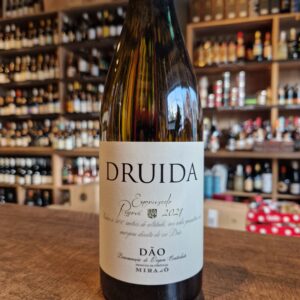 Mira do O produces expressive, concentrated wines. Despite the concentration, all the wines are fresh, elegant, well-balanced and shows great maturation potential. Dao region is valued by wine lovers for its expressiveness, freshness, concentration of taste and longevity of the wine. The region is a little further away from the Atlantic Ocean, but its cold winds still cool Dao vineyards. For this reason, the wine is high levels of acidity and great balance. The poor granite soil prevalent in the region gives the wines more texture, depth and spice. It is worth mentioning that here is a register and a large part of the old, local Portuguese grapes. Mira do O Druida Encruzado Reserva is made from a small vineyard located on a 500-meter plateau. This plateau provides protection from excess Atlantic moisture. At the same time, the temperature fluctuations caused by this altitude allow the grapes to ripen perfectly during the day, but they are more refreshing due to the cooling vineyards. The winemaker follows the principle of minimalist intervention: to change the wine as little as possible during its production. For this reason, the very characteristics of the grape stand out. Pair it with aperitif, roast white meats, sautee greens
Mira do O produces expressive, concentrated wines. Despite the concentration, all the wines are fresh, elegant, well-balanced and shows great maturation potential. Dao region is valued by wine lovers for its expressiveness, freshness, concentration of taste and longevity of the wine. The region is a little further away from the Atlantic Ocean, but its cold winds still cool Dao vineyards. For this reason, the wine is high levels of acidity and great balance. The poor granite soil prevalent in the region gives the wines more texture, depth and spice. It is worth mentioning that here is a register and a large part of the old, local Portuguese grapes. Mira do O Druida Encruzado Reserva is made from a small vineyard located on a 500-meter plateau. This plateau provides protection from excess Atlantic moisture. At the same time, the temperature fluctuations caused by this altitude allow the grapes to ripen perfectly during the day, but they are more refreshing due to the cooling vineyards. The winemaker follows the principle of minimalist intervention: to change the wine as little as possible during its production. For this reason, the very characteristics of the grape stand out. Pair it with aperitif, roast white meats, sautee greens -
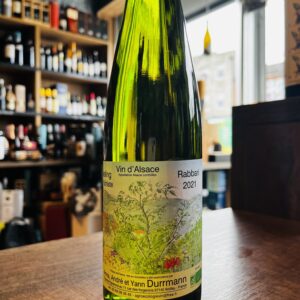 This wine is imported directly and only for Pinto Wines Riesling on Schist makes its terroir apparent with a livewire acidity and snap, rocky, chalky and mineral. Low yielding parcels. Long and driving, a little structure from 2022. The Durrmann family are making wine from their old family house in the middle of Andlau, a beautiful village nestled on the first slopes of the Vosges mountains south-west of Strasbourg. With a surface of only 1,5 hectare at the beginning in 1979, the domaine gradually reached a total surface of seven hectares after André decided to move back to farming and pieced it together from abandoned vineyard sites that were hard to work and no longer commercially viable, coming from his grandfather who made shoes to supplement the farm income. This lack of an established and family-based wine making tradition initially presented a weakness because the whole business had to be built, but it is also a strength because the company wasn’t limited to traditional customs, and therefore has always been oriented toward innovation. The vineyards are now scattered on about 30 spots around the village. They added parcels progressively when opportunities showed up and looked also for different soil qualities so that the cuvées express several terroirs. The Durrmans think that the quality of the wine is created by the work in the vineyard, that’s why their objective is its preservation. The wines are being disturbed as little as possible. They do not add any oenological product to change the natural taste of the wines. The production is partly vinified in inox tank and partly in old wooden casks. Son Yann has worked in the domaine since he was a child and officially took over the running of the business a year ago. André was among the first wave of organic winemakers in Alsace converting in 1998, Yann has then taken this a step further applying a more natural approach in the cellar. Selected cuvées are produced without sulfur addition since 2007. The Durrmanns are true eco warriors only having electric cars and using solar energy for hot water and heating. Pair it with Pork, Seafood, Curries, Spicy dishes
This wine is imported directly and only for Pinto Wines Riesling on Schist makes its terroir apparent with a livewire acidity and snap, rocky, chalky and mineral. Low yielding parcels. Long and driving, a little structure from 2022. The Durrmann family are making wine from their old family house in the middle of Andlau, a beautiful village nestled on the first slopes of the Vosges mountains south-west of Strasbourg. With a surface of only 1,5 hectare at the beginning in 1979, the domaine gradually reached a total surface of seven hectares after André decided to move back to farming and pieced it together from abandoned vineyard sites that were hard to work and no longer commercially viable, coming from his grandfather who made shoes to supplement the farm income. This lack of an established and family-based wine making tradition initially presented a weakness because the whole business had to be built, but it is also a strength because the company wasn’t limited to traditional customs, and therefore has always been oriented toward innovation. The vineyards are now scattered on about 30 spots around the village. They added parcels progressively when opportunities showed up and looked also for different soil qualities so that the cuvées express several terroirs. The Durrmans think that the quality of the wine is created by the work in the vineyard, that’s why their objective is its preservation. The wines are being disturbed as little as possible. They do not add any oenological product to change the natural taste of the wines. The production is partly vinified in inox tank and partly in old wooden casks. Son Yann has worked in the domaine since he was a child and officially took over the running of the business a year ago. André was among the first wave of organic winemakers in Alsace converting in 1998, Yann has then taken this a step further applying a more natural approach in the cellar. Selected cuvées are produced without sulfur addition since 2007. The Durrmanns are true eco warriors only having electric cars and using solar energy for hot water and heating. Pair it with Pork, Seafood, Curries, Spicy dishes -
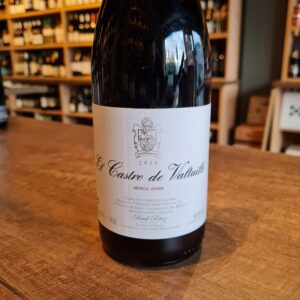 The Castro Ventosa estate was founded by the Perez family in 1752 and has been in the family ever since. They own 75 hectares of Mencía vines in Bierzo, making them the biggest owners of this varietal within the D.O Bierzo. For this wine, younger vines are used from 17 parcels across the Valtuille de Abajo village zone. Vines range from 20-40 years and viticulture is conventional, everything is done by hand and vines are not irrigated. Pair it with hard cheese, pasta, red meat, roasted vegetables.
The Castro Ventosa estate was founded by the Perez family in 1752 and has been in the family ever since. They own 75 hectares of Mencía vines in Bierzo, making them the biggest owners of this varietal within the D.O Bierzo. For this wine, younger vines are used from 17 parcels across the Valtuille de Abajo village zone. Vines range from 20-40 years and viticulture is conventional, everything is done by hand and vines are not irrigated. Pair it with hard cheese, pasta, red meat, roasted vegetables. -
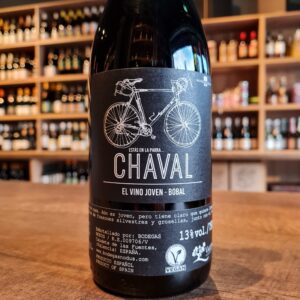 Young red wine with very fruity notes from the bobal. 100% organic wine with Vegan certification. Monitoring of maturation to determine the optimal time of harvest. Selection of grapes, controlled fermentation at low temperature and long maceration in stainless steel tanks. It came with very fruity notes from the bobal. Try it with pizza; couscous, rocket, roasted squash and spicy yogurt; or roast lamb.
Young red wine with very fruity notes from the bobal. 100% organic wine with Vegan certification. Monitoring of maturation to determine the optimal time of harvest. Selection of grapes, controlled fermentation at low temperature and long maceration in stainless steel tanks. It came with very fruity notes from the bobal. Try it with pizza; couscous, rocket, roasted squash and spicy yogurt; or roast lamb.


